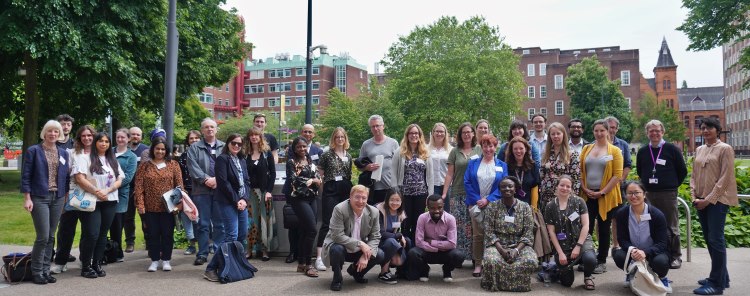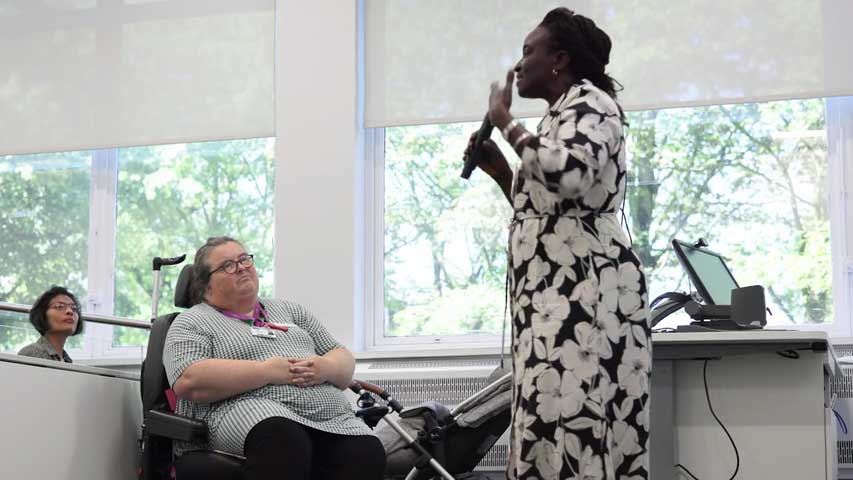Events
Our events provide a platform to table ideas and discuss solutions for issues highlighted in the recent UN’s Sustainable Development Goals report.
Past events
2023
Connectivity and inclusivity in HEIs - A solutions' based approach
Theme for the 2023: “To be an agent of change, you need to understand your environment” – Professor Monioluwa Olaniyi, National Open University of Nigeria, Keynote speaker at this event.
The 2023 June 14th event culminates the transformative series of the C and I workshops which started in 2022. The project established the fact that by recognising lived experiences as an essential source of knowledge, shared perspectives from partners are required if we are to be genuinely interconnected and inclusive. By using The University of Manchester as a case study, we
- reviewed and analysed the connectivity and inclusivity study outcomes and, the application of the principles-focused evaluation approach.
- explored the terms "connectivity, inclusivity" and impact from the Global South (i.e., Nigeria, West Africa) perspective by listening to a keynote address.
- hosted a panellist discussion on the principles and practice of connectivity and inclusivity.
- reflected on the barriers to connectivity and inclusivity with LEGO® SERIOUS PLAY®, as a means to effectively connect and be inclusive.
- enjoyed a space where connectivity advocates and practitioners were encouraged and inspired.
Participants at the event included all staff- academic and non-academic, senior leaders, students (PG and UG) from within and outside of the academia; professional science organisation, community organisations and religious institutions.
The resources for the 2022 C and I event and the WiES from 2018 and 2019 were shared with participants can be found on in our resources section. The resources from the 2023 workshop will be disseminated soon.
Additional sessions from the event are available on YouTube.
The project was sponsored by The National Environmental Research Council (NERC) - National Community for Engaging Environments, Wellcome EDIA, School of Natural Sciences, Faculty of Science/Engineering, The University of Manchester (UK)
2022
Following the recent interesting and innovative workshops on “Connectivity and Inclusivity in Higher Education, a solutions’ - based approach”, participants learnt that through understanding connectivity in nature’s ecosystem and appreciating biological diversity, we could adopt the principles for genuine human connectedness and appreciate human diversity more.
Dr Cecilia Medupin, Dr Cindy Regalado (Tekiu Limited) and Mr Matthew Burrows (NERC Engaging Environments) give their eight-point plan for how to be genuinely connected and inclusive in UK higher educational institutions.
Summary of the workshop event
There is a great need for equality, diversity, inclusion, and accessibility (EDIA) initiatives to recognise lived experiences as essential to sharing of knowledge and to directly inform practice. By using the University of Manchester, UK as a case study, this workshop aims were to:
• explore the diverse aspects of connectivity through leadership, teaching, learning and workings of our institution.
• explore co-production of knowledge and practices by members of the UoM community.
• identify synergies, interactions, and conflicts of EDIA to connectedness and inclusivity and, act on co-created ways to redress them.
Two workshops were developed based on the Principles-Focussed Evaluation approach in order to synthesise key principles for that guide our work and EDIA implementation at the Higher Education Institutions including the UoM.
The two workshops which involved six guest presentations from the academia, NERC’s Engaging Environments project, the professional science organisation (British Ecological Society), and from the Directorate of EDIA, People and Organisational Development of The University of Manchester, eight breakout sessions on pre-selected themes, evaluation of outcomes from guest presentations, knowledge exchange sessions and a call to action were attended by 110 participants from across the UK.

The target audience included EDI practitioners, academics and non-academics, students, researchers from The University of Manchester comprising people of diverse ages, ethnicities, career stages, and friends of The University of Manchester, UK community and participants from all parts of the United Kingdom. The outcomes of the first workshop were synthesized including surveys, interviews, audio transcripts, knowledge exchange sessions to show inclusivity is everyone’s responsibility. Following the outputs from both workshops 1 and 2, it became clear that the concept of connectivity and inclusivity could only be achieved if the following points are embedded into the leadership processes, teaching, research, and operations of the UK higher educational institutions:
1. By understanding the role of connectivity in nature’s ecosystem provides insight into the connectedness needed amongst human beings for effective inclusion and sustainable community development.
2. Create an enabling and welcoming atmosphere: by creating an enabling environment where people can feel free, safe, and be themselves will enable then to be open, connect with other people genuinely and expose them to other forms of learning.
3. A clear purpose for meeting in any community and amongst the people is vital for effective inclusivity and connectedness.
4. Be open to learn new things always: there is always something new to learn. Attend event like the connectivity and Inclusivity workshops with an open mind to learn from others; openness leads to a need to recognise problems and to act.
5. Share stories: stories provide a better understanding on what it means to be truly inclusive and connected; enables us to reflect on our own ways of perceiving issues and to correct/improve upon them.
6. Promote good values e.g. by actively listening to others’ lived experiences, being genuinely supportive. These can open new ways/approaches to implement connectedness in our communities.
7. Change in culture: incorporate learnings-principles, practices, at work (teaching/learning/operations) home and communities e.g. transparency and openness in decision making processes.
8. Apply lessons learnt from attending workshops such as this: identify areas that you need to change, adopt strategies to implement change and share with others what you have learnt.
What’s next?
Participants agreed to a “call for action” and, there will be a follow-up to the events and outcomes which will be communicated with participants and to all the other interested parties. To ensure connectivity and inclusivity in higher educational institutions, this starts with us as individuals. Inclusivity starts with I” and we all have a collective responsibility. The discussion with this group is a great start to making the changes that need to happen both within The University of Manchester and more broadly.
The podcast from the workshops could be found here:
- Connectivity And Inclusivity In Higher Education- A Solutions' Based Approach_ Part 1
- Connectivity And Inclusivity In Higher Education- A Solutions' Based Approach_ Part 2
Dr Cecilia Medupin is a Senior Lecturer in the Department of Earth and Environmental Sciences, at The University of Manchester and convener for Women in Environmental Sciences group and, Connectivity And Inclusivity In Higher Education Institutions- A Solutions’ Based Approach.
2021
Earthwatch Europe Virtual Community Science Camp – Lessons and outcomes from the Women in Environmental Sciences.
2019 conference
In 2019, WiES held a conference where we shared the key learning outcomes received at the talks and presentations and we explained how each talk aligns with the UN SDGs. We also had the opportunity to hear the personal reflections of the speakers a year after their 2018 presentations. Read the article.
2018 conference
In the summer of 2018, WiES held its first ground breaking conference which focussed on the way that climate change, and its environmental consequences, will impact on women. Read more on the key outcomes from the conference.

